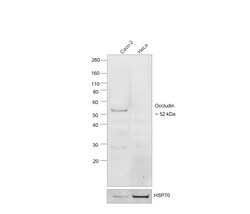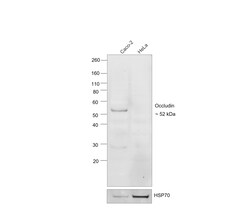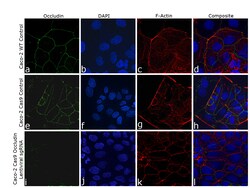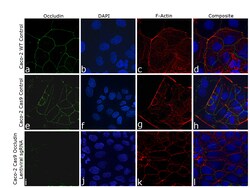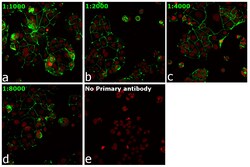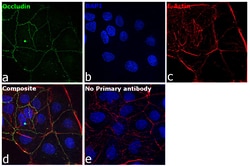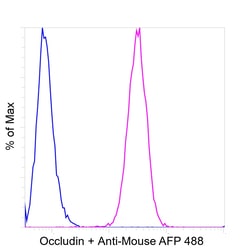Learn More
Occludin Recombinant Mouse Monoclonal Antibody (OC-3F10), Invitrogen™
Mouse Recombinant Monoclonal Antibody
$223.00 - $446.00
Specifications
| Antigen | Occludin |
|---|---|
| Clone | OC-3F10 |
| Concentration | 1.0 mg/mL |
| Applications | Flow Cytometry, Western Blot, Immunocytochemistry |
| Classification | Recombinant Monoclonal |
| Catalog Number | Mfr. No. | Quantity | Price | Quantity & Availability | |||||
|---|---|---|---|---|---|---|---|---|---|
| Catalog Number | Mfr. No. | Quantity | Price | Quantity & Availability | |||||
74-000-6M

|
LIFE TECHNOLOGIES
740006M |
100 μL |
Each for $446.00
|
|
|||||
74-000-6M20UG

|
LIFE TECHNOLOGIES
740006M20UG |
20 μL |
Each for $223.00
|
|
|||||
Description
Recombinant mouse monoclonal antibodies are produced using in vitro expression systems. Recombinant antibodies are produced using specific genes that code for the desired antibodies. These genes are cloned into an expression vector and expressed in vitro. The advantages of recombinant antibodies include better specificity and lot-to-lot consistency. It is recommended that the antibody be carefully titrated for optimal performance in the assay of interest.
Occludin is a 65 kDa protein that can exist in a variety of phosphorylated forms, ranging up to approximately 82 kDa. Occludin is thought to be involved in regulating both the localization and the function of occludin. Polyunsaturated fatty acids are known to up-regulate occludin expression, increasing the transendothelial cell resistance and reducing the cellular permeability to large molecules. The level of occludin varies greatly depending on tissue; in brain tissue, occludin is highly and continuously expressed at cell-cell contact sites, whereas non-neural tissues show lower expression and discontinuous distribution. Overall structural features of the occludin protein are highly conserved in all the species examined. Under-expression of tight junction proteins, including occludin, is a key molecular abnormality responsible for the increased permeability of tumor endothelial tight junctions, which contributes to brain tumor edemas.Specifications
| Occludin | |
| 1.0 mg/mL | |
| Recombinant Monoclonal | |
| Liquid | |
| RUO | |
| PBS with 0.09% sodium azide; pH 7.4 | |
| AI503564; BLCPMG; Occludin; occludin 1B; Ocl; Ocln; phosphatase 1, regulatory subunit 115; PPP1R115; tight junction protein occludin; tight junction structural protein | |
| OCLN | |
| IgG1 κ | |
| Protein A/G | |
| OCLN |
| OC-3F10 | |
| Flow Cytometry, Western Blot, Immunocytochemistry | |
| Unconjugated | |
| Mouse | |
| Human | |
| Q16625 | |
| 100506658 | |
| GST fusion protein consisting of the C-terminal region (~150aa) of human occludin. | |
| Primary | |
| Store at 4°C short term. For long term storage, store at -20°C, avoiding freeze/thaw cycles. |
The Fisher Scientific Encompass Program offers items which are not part of our distribution portfolio. These products typically do not have pictures or detailed descriptions. However, we are committed to improving your shopping experience. Please use the form below to provide feedback related to the content on this product.
